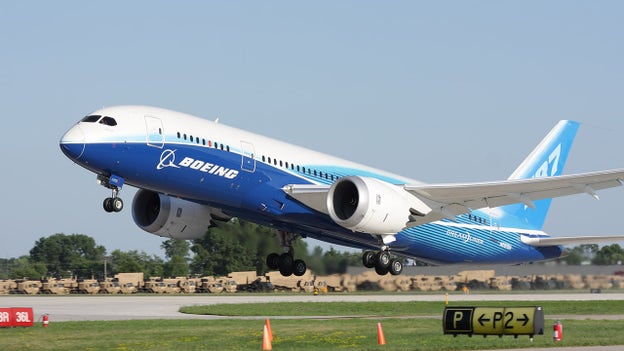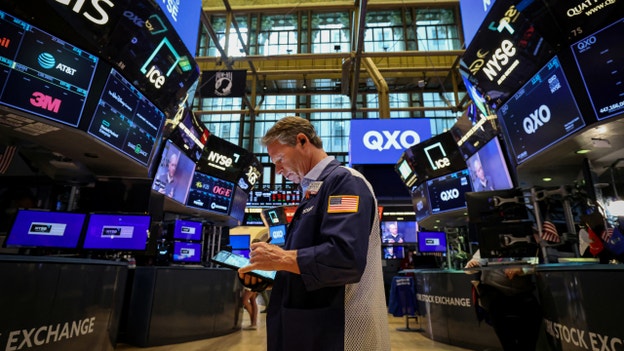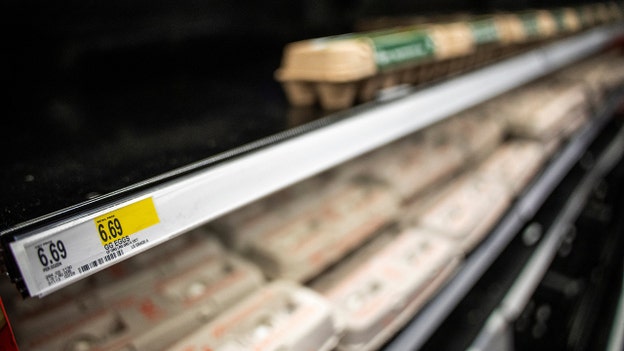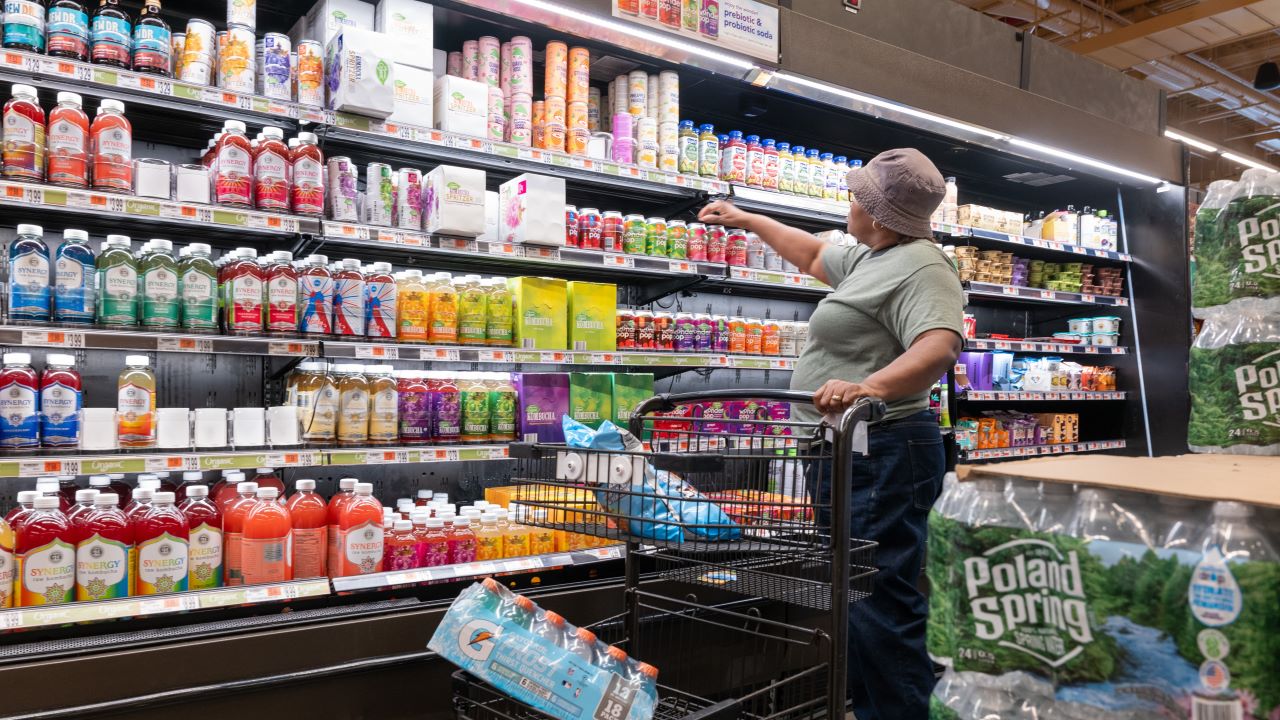Stocks ride trade deal wave, Trump in Middle East, oil climbs: Live Updates
Trade deals are driving the recovery for U.S. stocks with the S&P 500 erasing all of its losses post Liberation Day. President Trump continues his Middle East trip striking partnerships and investments, this as oil stabilizes above $60 per barrel, while higher bond yields remain the wildcard. FOX Business is providing real-time updates on the markets, commodities and all the most active stocks on the move.
Coverage for this event has ended.
President Donald Trump signed a $1.2 trillion economic commitment with Qatar, the White House said on Wednesday.
The deal will "drive innovation and prosperity for generations, bolster American manufacturing and technological leadership, and put America on the path to a new Golden Age," the White House said in a factsheet.
Boeing and GE Aerospace also secured a "landmark order " from Qatar Airways, a $96 billion agreement to acquire up to 210 American-made Boeing 787 Dreamliner and 777X aircraft powered by GE Aerospace engines, according to the fact sheet.
This is Boeing's "largest-ever" 787 order, and will support 154,000 U.S. jobs annually, totaling more than 1 million jobs in the U.S. during the course of production and delivery of the deal, the White House said.
Stocks finished mostly higher on Wednesday as investors eye potential trade deals.
The Dow Jones Industrial Average closed 89.37 points, or 0.21%, lower while the Nasdaq Composite climbed 0.72%. The S&P 500 eked out a small gain of 0.1%.
Investors waited on a potential trade deal from President Donald Trump’s meeting with Syria’s president in Saudi Araba despite a wave of optimism over a U.S.-China tariff truce earlier in the week.
Stocks finished mostly higher on Tuesday, extending the prior session's rally, on softer inflation data and trade optimism.
Trump was meeting with interim Syrian President Ahmad al-Sharaa in Saudi Arabia on Wednesday after saying he would move to lift U.S. sanctions imposed on Syria under the ousted former president Bashar al-Assad.
Reuters contributed to this report.
Egg prices declined in April for the first time in months after shortages caused by an avian flu outbreak caused prices to surge.
The Bureau of Labor Statistics (BLS) released its consumer price index report for April on Tuesday, showing egg prices declined by 12.7% when compared with the prior month. That followed monthly increases of 10.4% in February and 5.9% in March.
The last decline in egg prices was recorded in October. After Trump's election victory, his administration rolled out a plan to fight high egg prices that was led by Agriculture Secretary Brooke Rollins. She signaled that the U.S. would look to import eggs in the short term to help boost supply as domestic egg producers dealt with the effects of the outbreak. The plan also involved deregulation, biosecurity investments, repopulating fowl and investing in vaccines and therapeutic research.
A report by the USDA that was released on Friday showed that imports of eggs and liquid egg products have risen to help mitigate the domestic shortage and price increases, which have in turn boosted inventories.
Despite those efforts, the USDA report noted that egg prices remain at relatively high levels for consumers compared with historical trends.
This is an excerpt from an article by Fox Business’ Eric Revell. To read more, click here.
Getting behind the wheel is about to get a little more expensive. Tariffs could raise the price of car insurance by nearly 10% later this year.
It’s a snowball effect of the 25% tariffs on imported cars and car parts. If car parts are more expensive or take longer to import, cars then cost more time and money to repair.
Increasing car parts prices go hand-in-hand with your insurance bill.
"When you get into an accident, your insurer often has to pay to replace the auto part,” said Matt Brannon, Insurify data journalist. “And if auto parts were more expensive because it comes from out of the country, then those costs often get passed on to consumers…the average popular new car would see about a 15% increase because of tariffs and in terms of insurance, it would go up about six percent year over year on top of what it was already going to up.”
This is an excerpt from an article by Fox Business’ Sunny Tsai. To read more, click here.
China criticized the trade agreement between the U.S. and the U.K. that could potentially push Chinese products out of British supply chains, according to a report.
The deal reached between America and Britain last week includes strict security requirements for the U.K.'s steel and pharmaceutical industries.
When asked about the agreement, China said it's a "basic principle" that countries should not target other nations when making deals, the Financial Times reported.
"Co-operation between states should not be conducted against or to the detriment of the interests of third parties," China's foreign ministry told the FT.
China has warned countries not to sign trade deals with the U.S. that threaten Chinese interests over concerns that President Donald Trump will use negotiations with American partners to pressure them to cut China out of supply chains.
This is an excerpt from an article by Fox Business’ Landon Mion. To read more, click here.
President Donald Trump on Tuesday brought back his criticism of the Federal Reserve's leadership for not cutting interest rates amid its concerns about inflation, which remains above the central bank's target range.
Trump criticized Fed Chair Jerome Powell in a Truth Social post, arguing that he's behind the curve in lowering interest rates when compared with America's peers.
"No Inflation, and Prices of Gasoline, Energy, Groceries, and practically everything else, are DOWN!!! THE FED must lower the RATE, like Europe and China have done," Trump wrote on his Truth Social platform. "What is wrong with Too Late Powell? Not fair to America, which is ready to blossom? Just let it all happen, it will be a beautiful thing!"
Trump has lobbied Powell and the Fed more broadly to lower interest rates to boost the economy and potentially offset price hikes stemming from his tariffs on imported goods. However, the Fed has signaled it will wait to cut interest rates until there are either signs of inflation returning to its 2% target or a weakening in the labor market.
The central bank has held the benchmark federal funds rate steady at a range of 4.25% to 4.5% at its last three meetings.
This is an excerpt from an article by Fox Business’ Eric Revell. To read more, click here.
Despite conducting business in the Middle East, President Donald Trump didn't miss a chance to verbally pummel Federal Reserve Chairman Jerome Powell...again. The latest jab came after a benign inflation report.
Stocks finished mostly higher on Tuesday, extending the prior session's rally, on softer inflation data and trade optimism.
The Dow Jones Industrial Average closed 269.67 points, or 0.64%, higher, while the S&P 500 and Nasdaq Composite rose 0.72% and 1.61%, respectively.
| Symbol | Price | Change | %Change |
|---|---|---|---|
| I:DJI | $42,140.43 | -,269.67 | -0.64 |
| SP500 | $5,886.55 | 42.36 | 0.72 |
| I:COMP | $19,010.08 | 301.74 | 1.61 |
The Bureau of Labor Statistics on Tuesday said that the consumer price index (CPI) – a broad measure of how much everyday goods like gasoline, groceries and rent cost – rose 0.2% in April compared with last month, while it was up 2.3% on an annual basis. The annual inflation rate was the lowest since February 2021.Both of those figures were slightly cooler than the estimates of economists polled by LSEG, who predicted a monthly figure of 0.3% and annual inflation of 2.4%. The rise in monthly inflation comes after an unexpected decline in March, when it fell 0.1%. Headline inflation was unchanged in April. Stocks surged on Monday after the U.S. and China agreed to roll back tariffs for a 90-day period.
The Dow Jones Industrial Average rose 1,160.72 points, or 2.81%, exiting correction territory. The S&P 500 climbed 3.26% and the Nasdaq Composite rose 4.35%, exiting bear market territory.
The tariffs President Donald Trump announced against China on April 2 are being cut by 24 percentage points for this temporary period while retaining the remaining ad valorem rate of 10% from that announcement, according to a joint statement. China agreed to the same stipulations, adding that it will "adopt all necessary administrative measures to suspend or remove the non-tariff countermeasures taken against the United States since April 2," the announcement stated.
Live Coverage begins here




